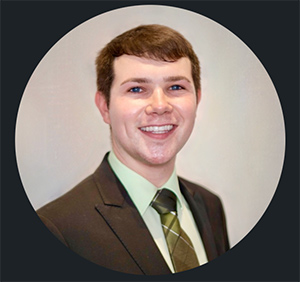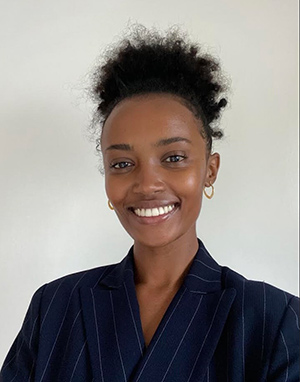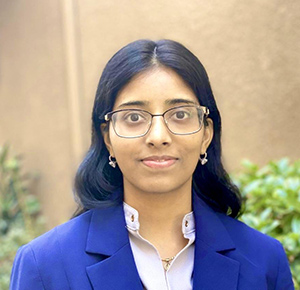By Andrew Cohen
Turning disappointment into gold — the mark of any great negotiator — three Berkeley Law students recently earned an exhilarating victory, one they foresee powerfully enhancing their budding legal careers.
Sewit Beraki ’24, Brandon Dailey ’24, and Kavya Dasari ’23 hoped to travel to Athens for The Negotiation Challenge, a prestigious annual competition among top law and business schools worldwide. When the COVID-19 pandemic quashed that plan, they promptly used the setback as motivational fuel — and won the 50-team competition on Zoom.

“We were very sad to miss the opportunity to go, and hope that next year’s team has the opportunity to compete in person,” Dailey says. “But we made the best of it.”
Participants must demonstrate a full spectrum of negotiation skills in the competition, which calls for various negotiations based on a diverse set of simulations. Competing over six rounds, one per week, the team put in a solid 10 hours each round (six preparing and four negotiating).
Evaluated by a group of international negotiation experts, participants aimed to thread the needle of gaining valuable concessions for their clients while also showcasing the ability to compromise and negotiate tactfully.
Coming to law school with a business background, Dasari had long recognized the importance of enabling people to find common ground and create value by working together. So when she learned about Berkeley Law’s Alternative Dispute Resolution Team team and its commitment to help students improve their negotiation skills, she decided to try out.
International exposure
“I was excited to take part in The Negotiation Challenge because it presented a chance to engage with negotiators from some of the best law and business schools from around the world,” Dasari says. “I hoped to learn and get exposed to different kinds of negotiation styles, and the competition did not disappoint.”
Berkeley Law’s trio negotiated with student teams from schools in Australia (Queensland University of Technology), China (Capital University of Economics and Business), Canada (McGill University), and India (Maharashtra National Law University Mumbai and NALSAR University of Law Hyderabad).

“We’re all influenced by the communities we come from and the pedagogy of the materials we spend time learning, so it was really refreshing negotiating with people who approached the issues differently,” Beraki says. “We were challenged to match the energy and the language that the other teams used so that we could communicate efficiently and effectively. Even though we unfortunately had to use Zoom for all of the competition, we still managed to learn a little bit about our fellow negotiators and the places they come from.”
Dasari will intern this summer at Quinn Emanuel Urquhart & Sullivan in New York, Dailey at Morrison & Foerster in San Francisco, and Beraki in Morrison & Foerster’s New York office. Each enjoyed The Negotiation Challenge’s intriguing and diverse fact patterns, and readily saw how they sharpened skills that will serve them well down the road.
“For example, in one round we represented industrialized countries in creating an agenda to address climate change. In another, we helped an Egyptian merchant trade her goods,” Dasari says. “The competition served as an opportunity to build transferable skills such as problem-solving, teamwork, and effective communication.”
Succeeding with civility
Throughout the competition, Dailey says he learned the importance of keeping a professional dynamic with opposing counsel in negotiation deals.

“Winning the biggest package in terms of finances can come at a huge cost if you don’t maintain a strong relationship with the other side,” he says. “Negotiations are challenging because there is no one right way to do it — negotiation style can be very different from person to person, and you have to learn for yourself what style works for you.”
The victory marked yet another shining success for Berkeley Law’s Advocacy Competitions Program. Over the past few months, student teams also won the national Tulane Pro Basketball Negotiation Competition and the Roger J. Traynor California Appellate Advocacy Moot Court Competition, also claiming best the individual advocate/oralist awards in each.
Be it the school’s trial, moot court, or ADR team, the surging program continues to expand in number of participants, competitions, and victories.
“Something I’ve observed about everyone at this school is the drive for excellence and collaboration,” Sewit says. “The ADR team is filled with people who have different negotiation styles and ways of being, but we’re able to appreciate and learn those different ways and utilize them in approaching competitions. I also know that the teams spend endless hours preparing, which definitely contributes to the results.”